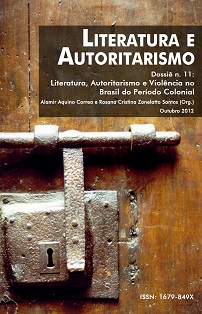A mocidade de Trajano: the representation of violence and prejudice in 19th century Brazil
DOI:
https://doi.org/10.5902/1679849X78441Keywords:
Representation, Slavery, Violence, PreconceptionAbstract
This article has as center of the discussion to estimate that the workmanship “A Mocidade de Trajano” of Visconde de Taunay constructs a representation of the violence and the racial preconception in Brazil in century XIX, touching in subjects as the slavery and the black people’s suffering in the brazilian farms. Visconde de Taunay through this romantic narrative, allow-in them to visualize an intense dialogue between the Fiction and the History represented in Brazilian Literature. In the novel, the author approaches the regimen of enslaved work in the great farms; the suffering and the preconception, as much in relation to the black people, how much to the woman African descent. In view of that the Cultural Studies have for objective to understand the culture in all its complexity and to analyze the context social politician and who is the manifest place where if the culture, is understood that the present workmanship contributes through the representation of the description-literary paper when focus a particular stage of the social development and Brazilian politician, as well as, of some ruptures in which was passing Brazil in century XIX. This work, therefore, considers an analysis, especially, concerning the aspects of the representation of the violence and the preconception, as well as of practical the cultural ones of the period.
Downloads
References
BOSI, A. História concisa da literatura brasileira. São Paulo: Cultrix, 1970.
BRUNO, E. S. Um livro de interesse literário e documental (Prefácio). In: TAUNAY, Visconde de. A Mocidade de Trajano. 2a. ed. São Paulo: Academia Paulista de Letras, 1984.
CANDIDO, A. Formação da literatura brasileira. Belo Horizonte: Itatiaia; São Paulo: EDUSP. 1975.
CANDIDO, A. A Personagem de ficção. São Paulo: Perspectiva, 1987.
CHARTIER, R. História Cultural: entre práticas e representações. Bertrand Brasil, Rio de Janeiro, 1990.
COSTA, E. V. Da Senzala à Colônia. [s.l.]; Livraria Editora Ciências Humanas Ltda, 1982.
GLEDSON, J. Machado de Assis: Ficção e História. Tradução de Sônia Coutinho. Rio de Janeiro: Paz e Terra, 1986.
MARETTI, L. L. O Visconde de Taunay e os fios da memória. São Paulo: Editora Unesp, 2006.
NEVES, F. L. S.; OURIQUE, J. L. P. A Força do Nacionalismo nas Leituras críticas da Literatura Brasileira do Século XIX: o caso de José de Alencar e do Visconde de Taunay. Revista Eletrônica Literatura e Autoritarismo: A Literatura Brasileira: História e Ideologia, v. 01, n. 15, Jan./Jun. 2010. Versão On-line. Disponível em: http://w3.ufsm.br/grpesqla/revista/num15/art_06.php. Acesso em: 12 out. 2010.
PESAVENTO, S. J. Revista Anos 90, Porto Alegre, n 04, dez. 1995. Disponível em: http://www.seer.ufrgs.br/index.php/anos90/article/view/6158/3652. Acesso em: 04 dez. 2010.
PRADO JÚNIOR. Caio. Formação do Brasil Contemporâneo. São Paulo: Brasiliense, 1981.
RAMOS, F. P. História, Narrativa e Linguagem: uma filosofia da história. Disponível em: http://fabiopestanaramos.blospot.com/2010/09/historianarrativa-e-linguagens-uma.html. Acesso em: 04 dez.2010.
RICOEUR, P. Tempo e Narrativa. Campinas/SP: Papirus, 1994. (Tomo I).
TAUNAY, A. E. A Mocidade de Trajano. São Paulo: Biblioteca Academia Paulista de Letras, 1984. (V. 13).
TAUNAY, A. E. Memórias. São Paulo: Melhoramentos, [s.d.].
Downloads
Published
How to Cite
Issue
Section
License
DECLARAÇÃO DE ORIGINALIDADE E EXCLUSIVIDADE E CESSÃO DE DIREITOS AUTORAIS
Declaro que o presente artigo é original e não foi submetido à publicação em qualquer outro periódico nacional ou internacional, quer seja em parte ou na íntegra. Declaro, ainda, que após publicado pela Literatura e Autoritarismo, ele jamais será submetido a outro periódico. Também tenho ciência que a submissão dos originais à Literatura e Autoritarismo implica transferência dos direitos autorais da publicação digital. A não observância desse compromisso submeterá o infrator a sanções e penas previstas na Lei de Proteção de Direitos Autorais (nº 9610, de 19/02/98).






